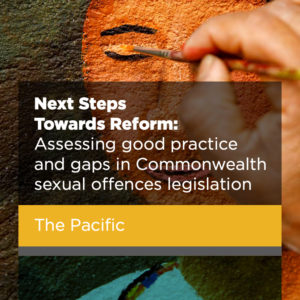Vanuatu’s sexual offences laws are in the Penal Code Act 1981 (PCA), as amended (Penal Code (Amendment) Act No 17 of 2003 and Act No 25 of 2006). Vanuatu does not have an evidence act and applies common law evidentiary rules.
Vanuatu has a hybrid justice system comprising the formal legal system and kastom, both of which are recognised under the Constitution. Kastom is administered by local chiefs. The jurisdiction of kastom ‘courts’ is officially narrow, limited to cases involving theft, land and family disputes. However, in practice chiefs also hear complaints of sexual assault. They do not necessarily apply the law as set out in the PC. Kastom is not assessed in this report.
Some sexual offences provisions assessed in this report meet good practice and human rights standards. For example, sexual assault offences are gender-neutral, there is no defence of consent to child sexual assault and consensual sexual activity with a person with disability is not a crime. ‘Sexual intercourse without consent’ has a good practice definition that criminalises non- consensual penetration by objects or any body part of vagina or anus as well as non-consensual cunnilingus and fellatio.
Although consensual same-sex sexual activity is not a crime in Vanuatu, it maintains discriminatory age of consent laws – 15 years for opposite-sex sexual activity and 18 years for same-sex sexual activity. Some other areas of the law evaluated below that do not meet the good practice criteria include for example, child sexual offences that are not comprehensive, no close-in-age defences to protect young people from being prosecuted for consensual sexual activity with their peers, and no definition of ‘consent’ as free and voluntary agreement. In addition, the legislation does not state that there is no exception for, or defence of marriage to a charge of sexual intercourse without consent or other sexual offence in any circumstance.
Vanuatu is a state party to the following relevant international human rights treaties: Convention on the Elimination of All Forms of Discrimination against Women, Convention on the Rights of the Child, Convention on the Rights of Persons with Disabilities, International Covenant on Civil and Political Rights and Convention against Torture and Other Cruel, Inhuman or Degrading Treatment or Punishment.
The full assessment of Vanuatu is available here.



